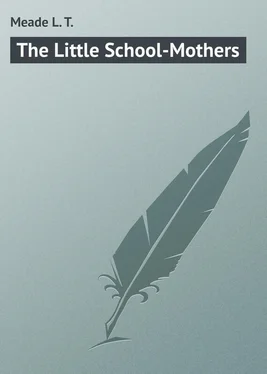L. Meade - The Little School-Mothers
Здесь есть возможность читать онлайн «L. Meade - The Little School-Mothers» — ознакомительный отрывок электронной книги совершенно бесплатно, а после прочтения отрывка купить полную версию. В некоторых случаях можно слушать аудио, скачать через торрент в формате fb2 и присутствует краткое содержание. Жанр: foreign_prose, foreign_children, на английском языке. Описание произведения, (предисловие) а так же отзывы посетителей доступны на портале библиотеки ЛибКат.
- Название:The Little School-Mothers
- Автор:
- Жанр:
- Год:неизвестен
- ISBN:нет данных
- Рейтинг книги:5 / 5. Голосов: 1
-
Избранное:Добавить в избранное
- Отзывы:
-
Ваша оценка:
- 100
- 1
- 2
- 3
- 4
- 5
The Little School-Mothers: краткое содержание, описание и аннотация
Предлагаем к чтению аннотацию, описание, краткое содержание или предисловие (зависит от того, что написал сам автор книги «The Little School-Mothers»). Если вы не нашли необходимую информацию о книге — напишите в комментариях, мы постараемся отыскать её.
The Little School-Mothers — читать онлайн ознакомительный отрывок
Ниже представлен текст книги, разбитый по страницам. Система сохранения места последней прочитанной страницы, позволяет с удобством читать онлайн бесплатно книгу «The Little School-Mothers», без необходимости каждый раз заново искать на чём Вы остановились. Поставьте закладку, и сможете в любой момент перейти на страницу, на которой закончили чтение.
Интервал:
Закладка:
Ralph could not honestly say that he loved lessons. He used to pretend he did, for he hated to grumble about things, and manly boys learned things – at least, so his father used to say. Manly boys always knew how to read, and they spelt words properly, and they wrote neat, good hands, and they learned, too, how to add up long, terrible rows of figures. All these things were necessary if a boy was to be manly and wise. Ralph knew perfectly well that he must go through with these unpleasant things. Nevertheless, he had to own that he did not like them. This school-mother, if he were to select her, would not be very particular about his reading aloud, and spelling properly, and working at his sums. Oh, no, he would have a good time with her; matches in his pocket, knives to play with – although his father did not like him to have knives – and, above all things, such a wonderful, glorious hope was held out to him! They would go away together, he and his school-mother, to see the gipsies. They would climb up the steps into that house on wheels; and, perhaps – perhaps – it would move, and they would feel it moving, and the brown babies would roll about on the grass at his feet, and the brown men and women would talk to him.
Harriet had spoken much to him about the delights of gipsy life. Ralph felt that he would give a great deal to taste it for himself. He tossed from side to side of his little bed, and presently he sat up, his cheeks flushed, his hair tumbled. “What would Father say to all this? Father liked boys to do lessons, and to lead orderly lives, and – ”
“Oh, Father!” sobbed the child. He could not help crying just a little bit. He wanted his father more than anything in all the world just then; yes, although his heart was full of Harriet and her proposal to visit the gipsies.
Book One – Chapter Seven
The Choice
The three remaining days of trial of the school-mothers went quickly by. There was suppressed excitement all over the third form. Harriet alone would not be induced to talk on the subject. She put on quite a good little air.
“No,” she said, “don’t let’s worry over the thing. Ralph will make his own choice. He is quite a nice little boy. He has a great deal of go in him, but he will make his own choice, whatever we say.”
Then Harriet would bend over her book, and pretend to be very industrious; while all the time she was watching Robina.
Robina had the wonderful faculty of jumping at conclusions. She caught at the sense of a thing in a flash. She had also an amazing memory. It was not the least trouble to Robina to learn a long poem by heart. She also remembered every single word told her by her teachers. She had never before been taught in the manner she was taught at school; but already she was amassing knowledge in a marvellous way. Notwithstanding all Harriet’s efforts, Robina, without the slightest trouble, kept at the head of the class. Every day Harriet tried to supplant her, or, rather, to get back her old position, but every single day she tried in vain. Robina kept her place in class, and the other girls now openly said to Harriet that she had not a chance.
“You have met your master,” they said, “and you may as well accept the position at once.”
It was by no means in Harriet’s nature to accept any such position, and her lanky little figure and pale face seemed to bristle all over with suppressed passion when she was addressed in this way.
On the night before Ralph was to make his decision with regard to the school-mothers, Harriet said a word to Jane.
“By this time to-morrow,” said Harriet, “we shall know everything.”
“Oh, yes; I suppose so,” said Jane. Then she added quickly: “I wish he had not come to the school.”
“Who do you mean by that?” asked Harriet.
“Ralph – I wish he had not come.”
“It can’t make any matter to you,” said Harriet.
“It does,” said Jane. “He is a nice little boy. I like him just awfully. He won’t be happy with you.”
“What do you mean by that?” said Harriet.
Jane was silent.
“You think,” said Harriet, in a low tone, “that I am sure to be selected by Mrs Burton as his school-mother?”
Jane nodded her head. Her little round face was quite flushed, and her black eyes were shining.
“Did he say anything to you,” asked Harriet, in great excitement. Jane nodded. Harriet felt her heart beating fast. She suddenly put her long, thin arm round Jane’s neck, drew her up to her, and kissed her.
“Then you have helped me,” she said. “I knew you would. I won’t forget it when the holidays come.”
Just then some other girls appeared in view, and Jane and Harriet had to separate. The other girls walked on arm-in-arm. They consisted of Rose and Vivian Amberley, Patience Chetwold and Robina. Robina was not quite au fait to the ins and outs of the school. She still lived more or less in a world of her own. Now, she was rather surprised when Vivian, who was leaning on her arm, gave it a violent tug, and said in a smothered voice, which only reached Robina’s ears:
“Oh, I am quite unhappy!”
This was the sort of remark which could not fail to interest Robina profoundly. She had been an only child all her life, and although she had now and then played with another child, and although the one dream of her existence was to be surrounded by other children, she had never enjoyed this pleasure daily and hourly until she came to school. Robina was full of faults, but she had a kind and generous nature. There was nothing mean about her, and she was, for an only child, absolutely unselfish. Vivian’s remark in a low tone was not heard by either Rose or Patience. Robina took an opportunity to draw the little girl aside, and to ask her what she meant.
“It’s about Ralph,” said Vivian.
“What about Ralph?” asked Robina.
“I dare not tell,” said Vivian.
“Very well,” said Robina; “then there is no use in questioning you.”
“But I am very, very unhappy, all the same,” said Vivian.
Robina looked at her longingly. “Sit down,” she said suddenly.
They had come to a wooden seat under an old oak tree. Vivian popped down at once, but Robina still stood.
“I don’t know much about school,” said Robina. “I have not been here long. I am not a specially good girl; I was often very troublesome at home, but I think I know a few things, and perhaps I learnt those things at home.”
“What are they?” asked Vivian.
“I have learned,” said Robina, “to know a good girl when I see her. There are some girls in this school who are not good.”
“Oh, yes; oh, yes!” said Vivian. She turned white, and clasped her small hands tightly together.
“And there are some girls in this school,” proceeded Robina, “who are not strong,” and she fixed her grey eyes on Vivian’s face.
“Yes,” said Vivian again, falteringly.
“I won’t name them,” said Robina; “but I will only just say this: that if I were a weak girl in the school, I’d just make up my mind that I was. I would not pretend that I was strong, for instance, and I’d go and tell anything that made me unhappy to the person who ought to know.”
“Oh, but you wouldn’t, if you were me,” said Vivian, suddenly speaking in great excitement.
“Does the cap fit?” asked Robina.
“Yes, yes,” answered Vivian; “it fits. But I can’t, I can’t!”
“I haven’t the least idea what is the matter,” said Robina; “but you are unhappy, for you have said so, and you are weak, not strong, for you admit it and, anyhow, I know. Now, being weak in a school like this, where there are some girls who are not good, you have no chance at all, unless you go to someone stronger than yourself to help you.”
Читать дальшеИнтервал:
Закладка:
Похожие книги на «The Little School-Mothers»
Представляем Вашему вниманию похожие книги на «The Little School-Mothers» списком для выбора. Мы отобрали схожую по названию и смыслу литературу в надежде предоставить читателям больше вариантов отыскать новые, интересные, ещё непрочитанные произведения.
Обсуждение, отзывы о книге «The Little School-Mothers» и просто собственные мнения читателей. Оставьте ваши комментарии, напишите, что Вы думаете о произведении, его смысле или главных героях. Укажите что конкретно понравилось, а что нет, и почему Вы так считаете.












